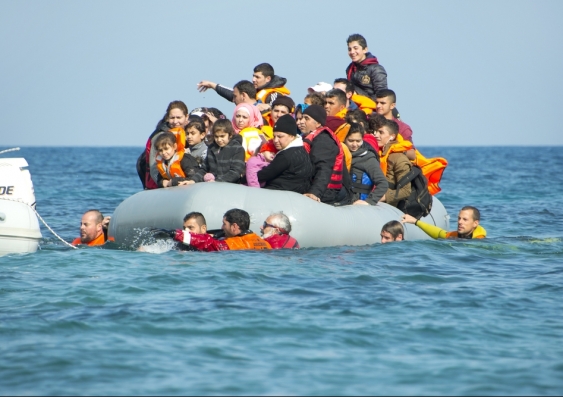World Refugee Day 2018: We can do better and we have done better
Bringing humane and principled order to the plight of those in search of refuge is a goal within our reach, writes Guy S. Goodwin-Gil.
Bringing humane and principled order to the plight of those in search of refuge is a goal within our reach, writes Guy S. Goodwin-Gil.

Kay Harrison
Media & Content
0402 602 722
kay.harrison@unsw.edu.au
OPINION: It’s World Refugee Day again. A day, one day, we hope, of not forgetting.
And then it will be tomorrow. And we can go back to forgetting, to looking away, to letting it pass – forgetting the numbers of suicides among young refugees, perhaps; or forgetting more tragedy at sea; or forgetting refugees and migrants dying without dignity, or children denied their family.
Of course, there is much work to be done. Would a day anyway ever be enough? In 1959, they set aside a whole year to close the last of Europe’s post-war refugee camps and find solutions for the remainder of that generation of the displaced. And they did it – they got there, even as new challenges broached the horizon.
So, we can cope and we can do better, and there is absolutely no reason why refugee and asylum policies and practices in this brave new world should simply add to the sum of misery.
It’s not that we shouldn’t talk about people moving and the impact they have on us and our lives, but all too often our picture of those who must flee the intolerable is incomplete or distorted. What is it about the movement of people that attracts the extremist, the worst of the functionaries, the worst of the politicians, and the worst of the media? Is it the ebb and flow of those on the move, and the apparent unpredictability of displacement? Is it knowing that this has always been with us, and that simple solutions just do not exist for what is quite definitely not a simple issue?
Or is it opportunism, together with the simple inability to take up challenging issues, and a lack of empathy or imagination, that generates the ‘tough’ response which works itself out in negative indifference, and in the positive abuse of those displaced, in breaking up families, just as the slavers did? Is this what encourages heads in the sand, the wilful disregard of ethnic cleansing and torture afar, and systemic ill-treatment on our doorstep? Is it just another excuse to demonise the other, to deny their common humanity, to make people illegal, all the while pretending that racism has nothing to do with it?
And if they would do it to ‘them’, what guarantees they won’t do it to us?
Whatever ‘they’ may say, if there is one reason for the so-called people-smuggling business model, it is not opportunity, but incompetence – government incompetence, its unwillingness to square the migration circle and, equally and equitably with others, to bring humane and principled order to the plight of those in search of refugee and livelihood.
The fact is – yes, it is a fact, not wishful thinking – that, as nations and communities, we can do better and we have done better. The numbers are not overwhelming. The ways of responding do not require arbitrary detention, or destitution by design, or denial of medical attention, or the wilful destruction of childhood, of lives and opportunities. Nor do the challenges allow us to wash our hands of the fate of others thereafter.
What is required, first off, is working together – not just states and governments, but communities and civil society. And working together requires listening, understanding, and often a compromise or two; it’s a process which, taken up in good faith, can lead to results in the common interest. The process also means working to a purpose, and while we all know about refugees and the drivers of displacement, we can always talk more about the goal of protection, and how to get there. No less important, we need to recognise what experience ought already to have taught us – that nothing happens overnight, that the needs of the displaced and the dislocated may well continue, that the temporary is commonly a delusion; and that while we should ever reach for solutions, they may yet exceed our grasp, for now...
There is absolutely no reason why refugee and asylum policies and practices in this brave new world should simply add to the sum of misery.
The fact is that we have the tools and the institutions, and we can add to them. The year ahead promises global compacts on refugees and migration, incomplete perhaps, and small steps, but steps nonetheless. We also have the experience. We know what works, and what does not. We know that protection is central to every aspect of the flight for refuge and survival, just as it is to each of our own lives.
We know also to take a stand against those who peddle panic and resentment for their own ends, the architects of the deliberate and intentional infliction of harm, the apologists for security extremism, who would have us believe it is all ‘necessary’. It isn’t, but what is necessary is an accounting.
World Refugee Day comes around each year. Time to wake up, once more. Time to act.
Guy S. Goodwin-Gill is the Acting Director of the Andrew and Renata Kaldor Centre for International Refuge Law at UNSW Sydney.